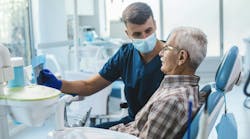The hidden impact of menopause on patients' oral health
Healthy smiles are about much more than esthetics. At my clinic, Rozenberg Dental NYC, the focus is primarily on the world of cosmetic dentistry. And in that world, it’s easy for patients to think of esthetics before anything else. Everyone wants brilliant white teeth. But it’s easy to forget that dentistry is not only a thing you want, but a thing you need. Our dental health needs shift with time. As we get older, we become more prone to gum disease and tooth loss. Menopause can contribute to these effects as well.
The lesser-known effects of menopause
Virtually everyone knows that menopause can have negative effects on mood, bone density, sleep, metabolism, and more. But not many understand that menopause can also have deleterious effects on your oral health.
In one recent study, a shocking 84% of women didn’t know that menopause could have a significant impact on oral health.1 Most women probably don’t think of their teeth when they imagine menopause, but hormonal changes have a much bigger impact than most people—and even many dentists—give them credit for.
When a woman goes through menopause, she might experience symptoms that range from mildly irritating to significantly disruptive:
Dry mouth: When estrogen levels dip as low as they do in menopause, saliva production decreases dramatically. That can cause an unpleasantly dry mouth. Unfortunately, that’s just the beginning.2 Saliva helps keep harmful bacteria in check, and when there’s simply not enough of it, there’s a greater risk of tooth decay and even fungal infections of the mouth.
Burning mouth syndrome: Dryness in the mouth can also cause secondary issues, and some of them can be alarming. One is burning mouth syndrome, which is just what it sounds like—a patient’s mouth feels like it’s burning, and that sensation can feel like gulping down too-hot coffee. The feeling may be constant, or it may come and go.3
Burning mouth syndrome often appears suddenly and for seemingly no reason, making it that much more disconcerting. However, this unsettling condition isn’t always caused by dry mouth or menopause, and sometimes, doctors can’t find an obvious cause.
Menopausal gingivostomatitis: This is a kind of gum inflammation that happens in menopause, and some of its earliest signs are shiny, red, sore gums that bleed after flossing or brushing.4
That might not sound too bad on its own, but the problems start to arise when patients do nothing to address their symptoms. As with any kind of gum disease, menopausal gingivostomatitis can cause gum recession if left untreated. Receding gums are a recipe for pain and eventual tooth loss.
Preserving oral health postmenopause
For patients, being proactive about their dental and oral health is a first-line defense against many of the dental issues that can come with menopause. With my own patients, I’ve found it helpful to offer some general tips and suggestions whether they’ve started experiencing menopause-related symptoms or not:
Communication: I make sure my patients know that it’s always important to communicate their dental health concerns to me so I can help them find solutions. Staying hydrated: Hydration alone likely won’t completely get rid of menopause-related dry mouth, but it can help reduce it.
Proper brushing: Reduced saliva can lead to bacterial buildup, so regular brushing is vital.
Toothbrush replacement: You should make it a habit to replace your toothbrush about every three months.
Overhauling your oral health routine: Almost no one’s oral hygiene is perfect, but the better it is, the less likely you are to suffer tooth decay.
What else can we, as dentists, do to help protect the oral health of menopausal women? It all starts with patient education, compassion, and understanding.
At my practice, we’ve worked with battered women, helping restore their smiles and get them back into the workforce. We’ve had patients who need extensive dental work, people who just want to lighten up their teeth, and everyone in between.
The key is to anticipate what it is the patient needs—even if the patient hasn’t quite articulated it yet.
Working together toward better health
When it comes to addressing the oral health of women in menopause, dentists need to strive to be as attentive as possible to patients’ individual needs and symptoms.
Not all women are going to experience something like dry mouth or a strange taste and immediately identify menopause as the culprit. As practitioners, it’s our job to educate our patients and help them connect the dots so they can lead healthy, fulfilling lives—both before and after menopause.
Editor's note: This article originally appeared in DE Weekend, the newsletter that will elevate your Sunday mornings with practical and innovative practice management and clinical content from experts across the field. Subscribe here.
References
- Unlocking menopause's hidden impact: 84% of women 50 and older unaware of menopause-oral health connection. Delta Dental. September 18, 2023. https://www.prnewswire.com/news-releases/unlocking-menopauses-hidden-impact-84-of-women-50-and-older-unaware-of-menopause-oral-health-connection-301929530.html
- Dry mouth. National Institute of Dental and Craniofacial Research. Last reviewed November 2023. https://www.nidcr.nih.gov/health-info/dry-mouth
- Burning mouth syndrome. Mayo Clinic. February 22, 2023. https://www.mayoclinic.org/diseases-conditions/burning-mouth-syndrome/symptoms-causes/syc-20350911
- Cherney K. All the ways menopause affects your oral health. Healthline. June 30, 2022. https://www.healthline.com/health/menopause/menopause-and-sensitive-teeth
About the Author
Lana Rozenberg, DDS
Lana Rozenberg, DDS, is a board-certified cosmetic dentist and founder of Rozenberg Dental NYC. Her practice on New York’s Upper East Side caters to celebrities and everyday New Yorkers alike. Dr. Rozenberg has over 25 years of experience in cosmetic dentistry, and her primary focus is on helping patients transform and restore their smiles to find new confidence. Her practice offers a range of procedures, including crowns, inlays, onlays, veneers, Botox, Invisalign, and more.


